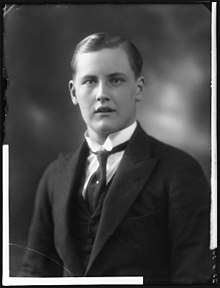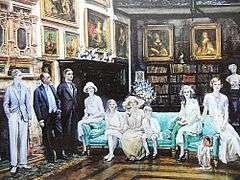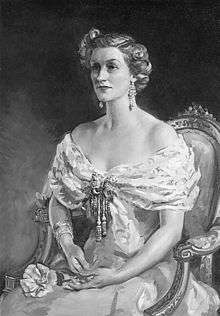William Lygon, 8th Earl Beauchamp
William Lygon, 8th Earl Beauchamp, JP, DL (3 July 1903 – 3 January 1979), styled as Viscount Elmley until 1938, was a politician in the United Kingdom. He was a Member of Parliament (MP) for East Norfolk. He was the eldest son of the controversial William Lygon, 7th Earl Beauchamp, sometime leader of the Liberals in the House of Lords.


Political career
Standing as a Liberal, he was elected as Member of Parliament (MP) for East Norfolk at the 1929 general election. At the 1931 general election, when the Liberal Party split over participation in Ramsay MacDonald's National Government, he stood and was elected in the interest of the breakaway Liberal National grouping (known as National Liberal after 1948), which aligned itself with the National Government even after the official Liberals (called "Samuelites" after their leader Herbert Samuel) crossed the floor into opposition in 1932, and eventually (in 1968) merged with the Conservative Party.
Lygon, known while an MP by his courtesy title, Viscount Elmley, retained his seat as a Liberal National in the 1935 general election. He succeeded to the peerage as the 8th Earl Beauchamp on his father's death in 1938. At his own death without male issue in 1979, his peerages became extinct.
Personal life

On 16 June 1936, he married Else "Mona" Schiwe (1895–1989), daughter of Viggo Schiwe (a Danish character actor of distinction) and former wife of Peter Christian Blicher Dornonville de la Cour (d. 1924). Beauchamp had no issue of his own by this marriage, but he gained a stepdaughter, Agnete Regitze Dornonville de la Cour (1916–2010).
At one time, he lived in the disused Winterton Lighthouse in Winterton-on-Sea, Norfolk, a village in his parliamentary constituency. After succeeding his father as the 8th Earl Beauchamp in 1938, he and his wife made their home at Madresfield Court, Worcestershire, the ancestral seat of the Earls Beauchamp.
In popular culture
He is sometimes said to be the model for the character of Lord Brideshead ("Bridey"), eldest son of the Marquess of Marchmain, in Evelyn Waugh's novel Brideshead Revisited, presumably because his father is often cited as the model for Lord Marchmain, the father of "Bridey".[1]
References
- Paula Byrne, "Sex scandal behind Brideshead Revisited", The Times (London), 9 August 2009
- Craig, F. W. S. (1983) [1969]. British parliamentary election results 1918-1949 (3rd ed.). Chichester: Parliamentary Research Services. ISBN 0-900178-06-X.
- Leigh Rayment's Peerage Pages
- Leigh Rayment's Historical List of MPs
External links
- Hansard 1803–2005: contributions in Parliament by William Lygon (Viscount Elmley)
| Parliament of the United Kingdom | ||
|---|---|---|
| Preceded by Sir Reginald Neville |
Member of Parliament for East Norfolk 1929–1938 |
Succeeded by Frank Medlicott |
| Peerage of the United Kingdom | ||
| Preceded by William Lygon |
Earl Beauchamp 1938–1979 |
Extinct |